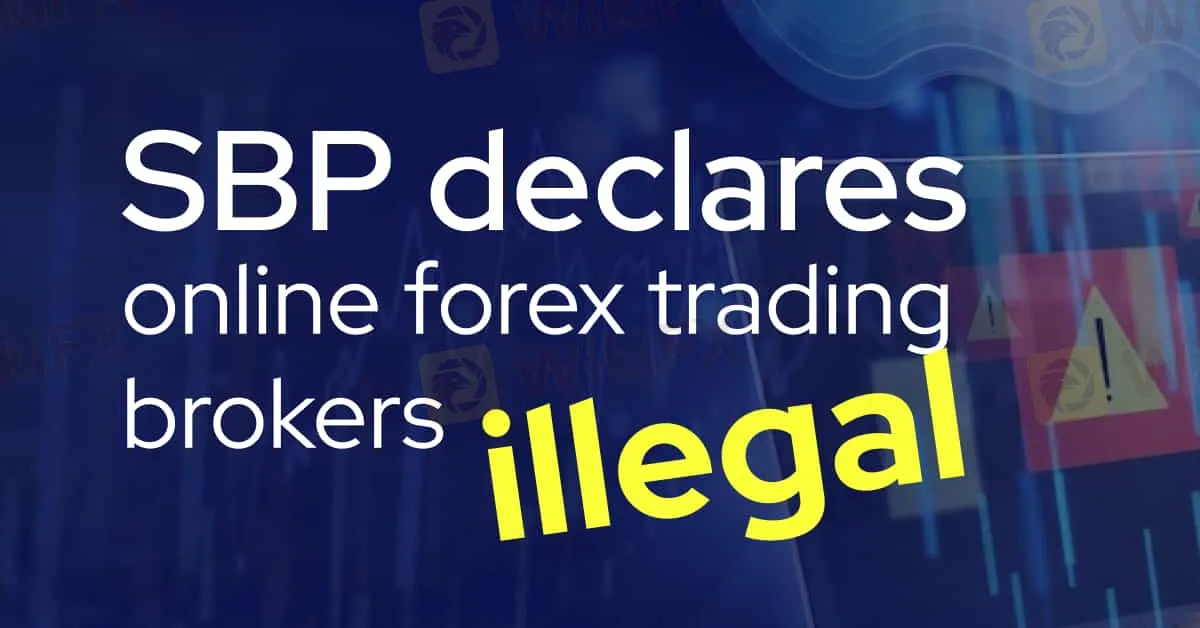简体中文
繁體中文
English
Pусский
日本語
ภาษาไทย
Tiếng Việt
Bahasa Indonesia
Español
हिन्दी
Filippiiniläinen
Français
Deutsch
Português
Türkçe
한국어
العربية
SBP declares online forex trading brokers illegal
Abstract: The SBP's decision to declare online forex trading platforms illegal was prompted by a surge in offshore foreign exchange trading, margin trading, and contract for difference (CFD) trading websites/apps/platforms targeting Pakistani residents.

Background
The SBP's decision to declare online forex trading platforms illegal was prompted by a surge in offshore foreign exchange trading, margin trading, and contract for difference (CFD) trading websites/apps/platforms targeting Pakistani residents. These platforms have been actively promoting their services on social media, attracting many Pakistanis to invest in forex trading.
Details of the Story
In a significant development, the State Bank of Pakistan (SBP) issued a circular on May 18, 2022, declaring online forex trading platforms, including Exness, OctaFX, and Easy Forex, illegal. The circular aims to curb the growing trend of illegal forex trading activities and to protect Pakistani residents from potential financial risks. The SBP's action is rooted in the Foreign Exchange Regulation Act (FERA) of 1947, and it highlights the importance of compliance and awareness in the financial sector.

The Legal Framework
The circular cites sections 4(1) and 5(1a) of the Foreign Exchange Regulation Act (FERA) as the basis for declaring these platforms illegal. Section 4(1) clearly states that only authorized brokers are permitted to engage in forex trading activities in Pakistan. Moreover, Section 5(1a) reinforces this by prohibiting any payments to entities or individuals residing outside Pakistan for forex trading, except under specific exemptions granted by the State Bank.
The primary reason behind declaring online forex trading platforms illegal is that they are not authorized brokers in Pakistan, nor do they possess any special permission from the State Bank of Pakistan. This means that any forex trading activity through these platforms is also considered illegal.
The SBP has observed that authorized brokers have been facilitating financial transactions to these illegal forex trading platforms through their payment channels. As a result, the SBP has directed authorized brokers to ensure compliance with FERA and take necessary actions to prevent their customers from making payments to these illegal platforms.
Recommendations to Authorized Brokers
The SBP has recommended that authorized brokers undertake the following measures to address the issue:
Customer Education: Authorized brokers should inform their customers about the inherent risks and the illegality associated with trading through these unauthorized platforms.
Ongoing Monitoring: Implement a mechanism to continuously monitor and identify trading websites/apps/platforms involved in illegal forex trading and block payments through any payment channel.
Warning of Consequences
The SBP's statement carries a clear warning of pecuniary or administrative actions against those who fail to comply with FERA. This underlines the seriousness of the matter and the need for strict adherence to the legal framework.
Conclusion
The growing involvement of Pakistanis in illegal forex trading activities has a detrimental impact on the country's foreign exchange reserves, which are already depleting rapidly. By curbing this trend, the SBP aims to stabilize the economy and protect the financial interests of its citizens.
The State Bank of Pakistan's circular dated May 18, 2022, declaring online forex trading platforms illegal is a decisive step towards ensuring compliance with financial regulations and safeguarding the interests of Pakistani residents. It underscores the importance of adhering to the Foreign Exchange Regulation Act and the need for authorized dealers to prevent any financial transactions on these illegal platforms. By taking these measures, the SBP aims to protect the country's foreign exchange reserves and promote a more stable financial environment for its citizens.

Disclaimer:
The views in this article only represent the author's personal views, and do not constitute investment advice on this platform. This platform does not guarantee the accuracy, completeness and timeliness of the information in the article, and will not be liable for any loss caused by the use of or reliance on the information in the article.
Read more

Webull Launches SMSF Investment Platform with Zero Fees
Webull introduces commission-free SMSF trading, offering over 3,500 US and Australian ETFs, with no brokerage fees and enhanced portfolio tools.

April Fool's Day Scam Prevention Experience Collection
Share your “Forex Fraud Prevention Experience”, win WikiFX points and gold rewards!

How Will the Market React at a Crucial Turning Point?
Safe-haven assets like gold and U.S. Treasuries are surging, while equities face mounting pressure. As this pivotal moment approaches, how will the market react?

Gold Prices Climb Again – Have Investors Seized the Opportunity?
Gold prices have hit record highs for three consecutive days, with a remarkable 19% gain in the first quarter, marking the strongest quarterly performance since 1986. As market risk aversion rises, demand for gold has surged significantly.
WikiFX Broker
Latest News
Exposing the Top 5 Scam Brokers of March 2025: A Closer Look by WikiFX
Gold Prices Climb Again – Have Investors Seized the Opportunity?
Webull Launches SMSF Investment Platform with Zero Fees
Australian Regulator Warns of Money Laundering and Fraud Risks in Crypto ATMs
FCA Warns Against 10 Unlicensed or Clone Firms
CySEC Warns Against 14 Unlicensed Investment Websites
Top Currency Pairs to Watch for Profit This Week - March 31, 2025
Will natural disasters have an impact on the forex market?
Philippines Deports 29 Indonesians Linked to Online Scam Syndicate in Manila
AI-Powered Strategies to Improve Profits in Forex Trading
Currency Calculator







